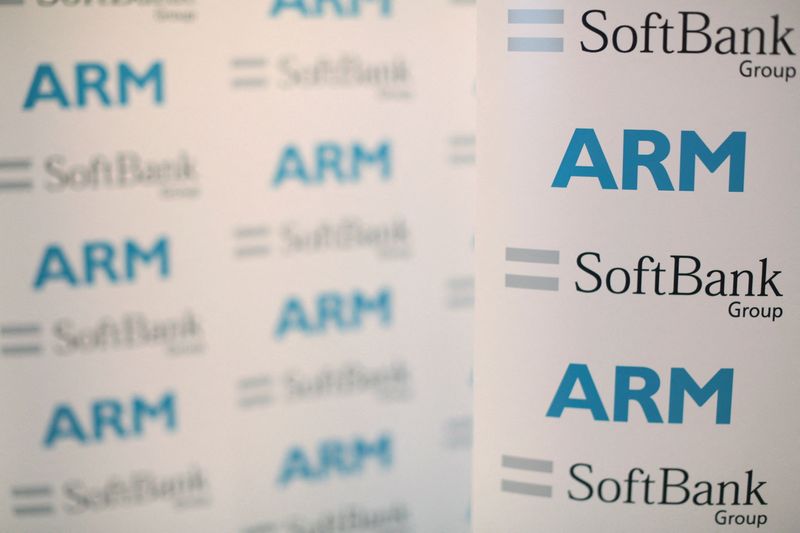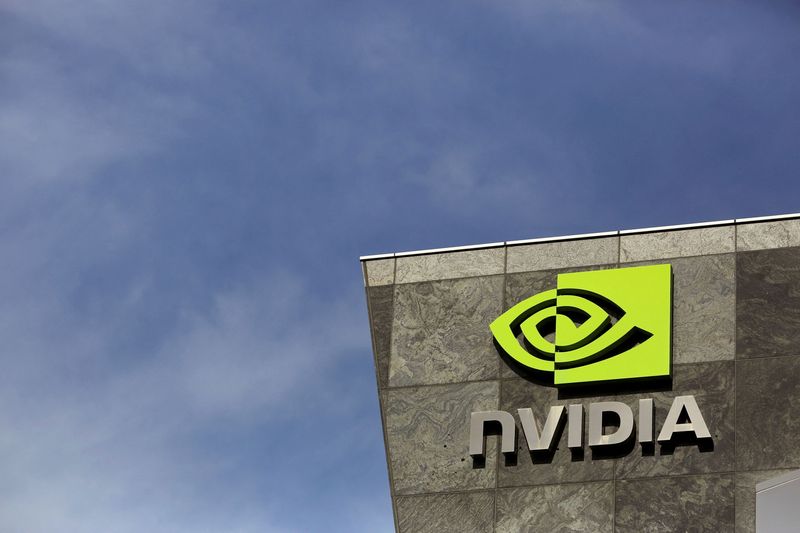By Jane Lanhee Lee and Josh Horwitz
SAN FRANCISCO/SHANGHAI (Reuters) - SoftBank Group Corp has shelved its blockbuster sale of Arm Ltd to U.S. chipmaker Nvidia (NASDAQ:NVDA) Corp valued at up to $80 billion citing regulatory hurdles and will instead seek to list the company.
Britain's Arm, which named a new CEO on Tuesday, said it would go public before March 2023 and SoftBank CEO Masayoshi Son indicated that would be in the United States, most likely the Nasdaq.
SoftBank acquired Arm, whose technology powers Apple (NASDAQ:AAPL)'s iPhone and nearly all other smartphones, in 2016 for $32 billion.
The collapse of its sale marks a major setback for the Japanese conglomerate's efforts to generate funds at time when valuations across its portfolio are under pressure.
Many SoftBank portfolio companies are trading below their listing price, with office-sharing firm WeWork, ride hailer Grab and used-car platform Auto1 all down last quarter.
"It (Arm) had the rare hallmarks of a SoftBank investment turning to gold, but instead Arm will head back for listing in financial markets where tech stocks have been seriously tarnished of late," Hargreaves Lansdown (LON:HRGV) analyst Susannah Streeter said, adding, "such a bumper valuation is likely to be far from reach."
The cash-and-stock deal with Nvidia was announced in 2020, but the U.S. Federal Trade Commission sued to block it in December, arguing that competition in the nascent markets for chips in self-driving cars and a new category of networking chips could be hurt.
The buyout also faced scrutiny in Britain and the European Union and had yet to receive approval in China, which has previously withheld approval of cross-border chip acquisitions.
The value of the sale, which depended on Nvidia's stock price, was originally pegged at about $40 billion but rose with Nvidia's stock price to about $80 billion late last year, though the California company's stock has fallen since.
The inability to acquire Arm is a missed opportunity for Nvidia, said CFRA Research analyst Angelo Zino, adding that the collapse of the deal removes an overhang on the stock and investors can now "focus on the company's attractive fundamentals".
Nvidia's shares fell 1.9% in trading before the bell.
On a company earnings call on Tuesday, SoftBank CEO Son, who had said the company initially considered listing Arm but opted to sell it instead due to the pandemic, sought to put a positive spin on the scrapped sale.
He said Arm would power revolutions in areas such as cloud computing and the metaverse and that it would be the most significant IPO the chip industry has ever seen.
SoftBank said it would recognise a $1.25 billion breakup fee that Nvidia had deposited as profit in the fourth quarter.
NEW CEO
Arm in a separate statement that it had appointed Rene Haas to replace Simon Segars as chief executive officer and member of the board, effective immediately. An industry veteran, Haas joined Arm in 2013 and previously worked for seven years at Nvidia.
"We are excited about the opportunity to be a publicly listed company again," Haas said in an interview with Reuters.
SoftBank said Arm's net sales surged 40% to $2 billion in the nine months to December.
An Arm acquisition would have put Nvidia into even more intense competition with rivals in the data center chip market such as Intel (NASDAQ:INTC) and Advanced Micro Devices (NASDAQ:AMD) Inc .
Arm licenses its architecture and technology to customers such as Qualcomm (NASDAQ:QCOM) Inc, Apple and Samsung Electronics (OTC:SSNLF) Co Ltd that design chips for devices from mobile phones to computers.
Nvidia has become the most valuable U.S. chip company on the strength of its graphic processor chips. Although still seen as crucial for gaming, graphic processors have become much more widely used for artificial intelligence and other advanced fields.
Nvidia said in a statement that it would retain its 20-year Arm license.
The collapse of the deal underscores again the difficulty that companies face in convincing antitrust regulators and governments to approve large tech deals, especially in the semiconductor industry.

Last week, a $5 billion deal between Taiwan GlobalWafers and German chip supplier Siltronic fell apart after German regulators failed to approve it on time.
In 2018, Qualcomm walked away from a $44 billion deal to buy NXP Semiconductors (NASDAQ:NXPI) after failing to secure Chinese regulatory approval, and former U.S. President Donald Trump blocked microchip maker Broadcom (NASDAQ:AVGO)'s proposed takeover of Qualcomm.
